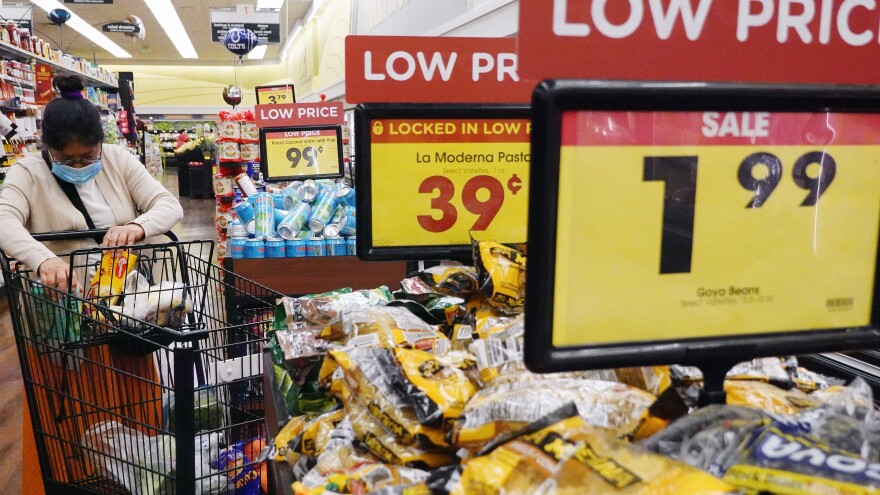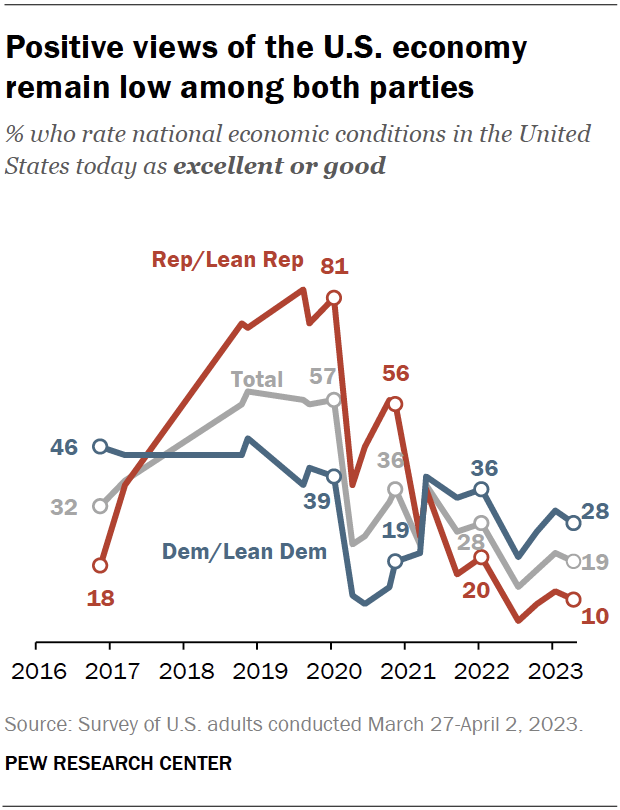The economy's good. The economy's bad.
It depends on who you ask — and increasingly which party is in the White House when you ask.
It was yet another strong jobs report Friday, exceeding expectations. Almost 200,000 jobs were created last month and unemployment dropped to 3.7%, which is near full employment.
People are also spending at a record rate this holiday shopping season — 200 million people shopped between Thanksgiving and Cyber Monday, higher than expectations and the most ever.
They spent a record $38 billion on holiday items during that short stretch, up 8% from a year ago.
And they're expected to spend nearly $1 trillion holiday shopping this year, according to the National Retail Federation.
Despite all that, pessimism about the economy reigns.
Both Gallup and the Pew Research Center found just 1 in 5 rated the economy as either excellent or good.
Inflation, which has led to higher grocery and gas bills than Americans would like, is partially to blame for souring their moods. But there's more going on here.
There is a huge divide by party on the question of the economy, and there's a stark switch that's been taking place when there's a new administration. And this party-line view of the economy is particularly noticeable among Republicans.
For example, according to Pew, in 2016 when former President Obama, a Democrat, was in office, just 18% of Republicans thought the economy was either good or excellent.
But in 2020, with Trump, a Republican, in office, that jumped to a whopping 81%. And this year, with Biden in the White House, Republicans' positive views of the economy tanked to just 10%.
Sure, inflation went up, but economics alone doesn't cause that kind of whiplash.
Consider: During Obama's tenure, the economy was still recovering from the Great Recession, but unemployment by the time Obama left office was at 4.7%. By February 2020, just before the pandemic hit, unemployment dropped to 3.5%, a decline to be sure, but not to the extreme that would explain Republicans' 63-point increase under Trump when inflation was flat.
Democrats were more optimistic about the economy during the recent Democratic presidencies, but not to the extent of Republicans' wild swings.
In 2016, 46% of Democrats had a more positive than negative view of the economy, according to Pew. In 2020 under Trump, Democrats grew more pessimistic, but only by 7 points.
In 2023, they declined further to 28% — still 18 points higher than Republicans, but nowhere near as bullish as Republicans were under Trump.
But the pessimism can't be dismissed as simply politics
While Republicans have had sharper changes in economic outlook and a lot of that may be politics, the fact that Democrats have also declined in their views of the economy does show that it's not all about politics.
The fact is inflation is one of those things people can see — they see it on massive signs at gas stations and on their grocery bills. Overall inflation after the pandemic began to rise and hit a high of 9.1% in June of last year. But food inflation was an even higher 11.4% last summer.
That meant that things like steak, bacon, eggs, cheese, potato chips, coffee, ice cream and cookies were more expensive. All are household items and noticeable every time someone checks out at the store.
Overall inflation and food inflation have both come down significantly since the start of the year, from 6.4% overall to 3.2% in October and from 10.1% to 3.3% for food.
There's been an especially sharp decline in food inflation since the summer, but that hasn't necessarily meant prices have come down much, if at all, and Biden isn't seeing any political benefit — 67% disapproved of Biden's handling of the economy in the latest Gallup survey, which is similar to other recent polls' findings.
Housing costs in many parts of the country remain high, and one of the reasons for inflation coming down is because the Federal Reserve hiked interest rates substantially, making the ability to afford a home significantly more difficult.
The economy, but more specifically how much stuff costs, is always going to be top of mind for voters. And there's no easy solution politically.
Biden and his campaign team have to hope that inflation continues to recede, the Fed starts to lower rates, and people feel a loosening of the pinch on their wallets in an election year, because right now this issue makes Biden especially vulnerable for reelection.
A version of this piece also appeared in NPR's Politics newsletter. Sign up for the newsletter so you don't miss out on the latest politics and campaign 2024 coverage.
Copyright 2023 NPR. To see more, visit https://www.npr.org.




